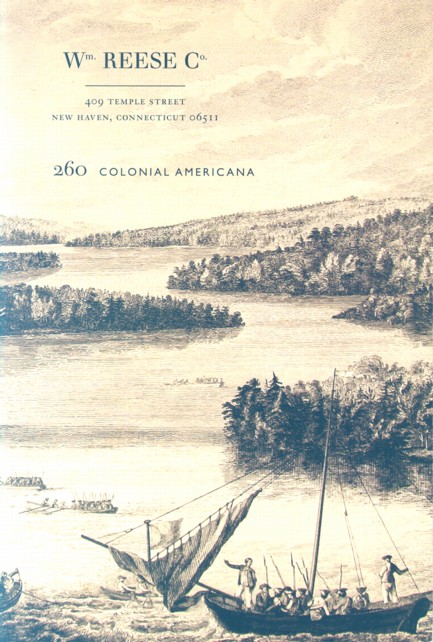Colonial Americana from the William Reese Co.

Colonial Americana from the William Reese Co.
By Michael Stillman
Americana bookseller the William Reese Company goes back to America's earliest days with their 260th catalogue, Colonial Americana. A few items even go back to the pre-Pilgrim days, such as accounts of Champlain's explorations. From there we go to the Jesuit Relations of life in the west, while the Mathers (father, son, and grandfather) make numerous appearances in late 17th, early 18th century New England. Explorations continue along the Atlantic colonies as we move further into the 1700s, and then mid-century, war breaks out, British colonists versus the French and Indians. That conflict won, relations quickly break down between the colonists and the mother country, and the later works bring us up to the brink of revolution. For those who collect America before the revolution, Reese offers a catalogue of 200 plus 1 items for your consideration.
Item 100 is the very rare second, and first obtainable, Jesuit Relation. These were the reports from Jesuit missionaries in the field of what was then the North American far west. This Relation, prepared by Paul Le Jeune, was published in Paris in 1634. The Relations were published from 1632-1680, and gave the earliest looks at the American interior at a time when it was still known as New France, and native customs were still mostly unaffected by western influences. Priced at $75,000.
Preachers attributing natural and unnatural calamities upon the American nation to the sinfulness of its people is nothing new. In 1755, Massachusetts Governor William Shirley saw the outbreak of the French and Indian War as America's punishment for its misbehavior. To repent, and hopefully avert the coming "calamity" of war, he issued this broadside: By His Excellency William Shirley, Esq....A Proclamation for a Publick Fast. Shirley hoped that if the colonists asked for God's forgiveness of their sins and participated in a fast, their "French neighbors" and "Indian savages," who had "unjustly and perfidiously invaded" their land, might withdraw. Evidently, the colonists did not respond with sufficient humility, for the war went on another seven years, but on the bright side, the British and their American colonists won the war and expelled the French from North America. Item 63. $4,500.
Item 180 is a copy of the document which ended that war, The Definitive Treaty of Peace and Friendship... The removal of the French would open the door to British expansion as far west as the Mississippi, where the Spanish were granted control. The celebrating British could not have imagined that rather than permanent victory, this was the beginning of the end to their American colonies. $10,000.
The ink was hardly dry on the treaty before the initial stirrings of discontent began to arise in America. The French and Indian War had cost the mother country plenty of money, and not unreasonably, the British Parliament felt the colonists should partake in those expenses since they had enjoyed the benefits. This view was not entirely shared by the colonists, especially the idea of taxes being imposed upon them without their consent. When a stamp tax, which would tax entirely internal transactions within the colonies, rather than foreign trade, was proposed in 1764, Connecticut Governor Thomas Finch wrote this pamphlet: Reasons Why the British Colonies in America, Should Not be Charged with Internal Taxes, by Authority of Parliament; Humbly Offered... This was a polite argument against taxing internal transactions, and against taxation without representation. Parliament ignored Finch and passed the Stamp Act the following year, which resulted in a much less "humble" response from the colonists, and a breakdown in relations between the two sides that would only be resolved through revolution. Item 55. $1,000.